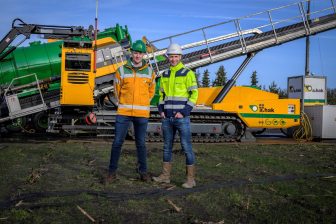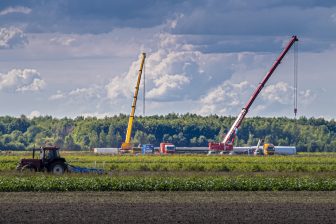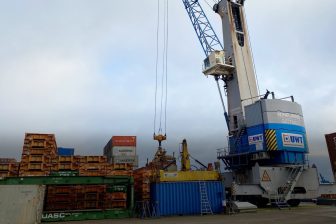Dr Joe Borg: A Maritime Policy for the EU
Brussels, Belgium – Speech of Dr Joe Borg
Member of the European Commission
Responsible for Fisheries and Maritime Affairs
A Maritime Policy for the European Union on World Oceans Day
Conference, organised by the Intergroup on Sustainable Development of the European Parliament, Supported by the Committee of the Regions
Members of Parliament,
Member of the Committee of the Regions,
Ladies and Gentlemen,
The Commission yesterday adopted a Green Paper on a Future Maritime Policy for the Union. This policy aims to promote an integrated approach to the oceans and seas beyond the traditional sectoral manner of looking at sea-related activities. Its adoption sets in motion a year long consultation process during which, we in the Commission, will listen very carefully to what you and other interested parties have to say.
Yesterday, I had the pleasure to present the Green Paper to the European Parliament, in a joint meeting of the Committees on Industry, Research, and Energy, Regional Development, Tourism and Transport, Environment and Public Health and Fisheries. Some of you here today were there yesterday too – for which I thank you.
I am equally pleased to address this forum today, not only because this is my second contact with Parliament in a very short time, but also because again, today, I have before me a cross cutting audience which I believe can add yet another dimension to the success of this holistic approach to the seas and oceans that we propose to now take.
I am thankful to those of you, Members of Parliament, who share the view that the debate on the Green Paper and on a future maritime policy for the Union should continue in the Parliament in a cross cutting forum, thereby allowing a thoroughly comprehensive analysis of our proposals and ideas.
It has been over a year now that I have been engaged in a fruitful cooperation on maritime policy with the Committee of the Regions. I am grateful for your support and in particular for the own initiative report on Maritime Policy drawn up by this Committee. Yours was an important contribution and I am now looking forward to your subsequent contributions on the Green Paper.
What makes this event today more timely, is the fact that I am addressing you on World Oceans Day – a day which recalls the important impact the oceans have on our daily lives, the economic and lifestyle benefits we derive from them and the crucial responsibility we have to protect and conserve their resources for generations to come.
An idea that could carry this forward at a specifically European level, was made by your honourable colleague, MEP Mrs. Kratsa, who suggested establishing a European Maritime Day.
Both World Oceans Day and other similar events, find a place at the heart of a future Maritime Policy for the Union.
The first objective of World Oceans Day is to promote a change in perspective . At a first glance, this may seem a somewhat facile objective, but it is in fact a crucial point. We need to look at new ways of doing things. We also need to encourage individuals to think about what the oceans mean to them and the extent to which the oceans and seas are a part of their lives.
It is useful to bear in mind that the maritime surface areas under the jurisdiction of our Member States are larger than the total land area of the European Union and no matter how far inland you live in Europe, you will never be more than 700km from the coast.
The importance of the oceans and seas cannot be underestimated. For the economy, their import is also tremendous as can be seen from the fact that maritime regions account for over 40% of Europe’s GDP. Moreover, 90% of the European Union’s external trade and 40% of its internal trade are transported by sea.
The environmental importance of the oceans is also crucial. And it is because of this, that we want Europeans to realise that they are citizens of a maritime continent. Cultivating a stronger feeling of maritime identity among Europeans will lead to greater stewardship and that, in turn, will lead to citizens taking better care of the oceans and seas. This will help us continue to raise awareness that the health of our oceans is a priority that will also benefit future generations.
The second objective of World Ocean’s Day is that it provides the opportunity to increase learning about the wealth and diversity of the oceans. Learning and more specifically, actual knowledge of the oceans and seas, is a key issue addressed by the Green Paper.
European research and technology, in maritime related areas, already occupies a front-seat in the world. But a lack of a cross-cutting and common vision, the duplication of efforts and certain gaps in our knowledge and technical know-how, prevent us from attaining our full potential. We must strive to ensure increased cooperation, coordination and dialogue between researchers in different disciplines and decision-makers at various levels, both in the private and public sector. Together with the skills that we already have, ground-breaking research and technology will greatly assist us in seizing new challenges and maximising our potential growth in this field.
The third objective of World Oceans Day is to provide an opportunity for us to ‘change our ways’ in order to benefit the oceans. This is the call for an integrated and all-encompassing approach that we find in the preamble to the United Nations Convention on the Law of the Sea, and in the 2002 Johannesburg world summit conclusions on sustainable development.
This is also the source of the international trend that has led Canada, Australia and the US to start working towards integrated oceans policies, along with a growing number of asian countries. It is also what has led to the inclusion, in the list of strategic objectives for the Commission for 2005-2009, of a reference to the particular need for an all-embracing policy aimed at developing a thriving maritime economy in an environmentally sustainable manner.
The essential drivers towards a more coordinated approach are the natural sciences, the development of technology, the ever-increasing list of ocean activities and the necessity to preserve the resource base on which all these activities depend. These issues, accompanied by more regulatory activity as well as the high cost of policing the oceans also call for a common approach.
Progress in science and wider knowledge has made it possible for us to understand the interactions between the different uses of the oceans and to move towards benefiting from these often overlapping activities. This increased understanding naturally challenges traditional sectoral and geographical approaches at a time when such continued traditional approaches are becoming ever more dated and at variance with existing realities.
Ladies and Gentlemen,
In the Green Paper, we first looked at the potential for job creation and growth of Europe’s maritime sectors. For instance, tourism is the biggest employer in coastal regions, but it depends on the health of the marine environment for its survival. This is why the Thematic Strategy for the Protection of the Marine Environment is a fundamental pillar of a future European maritime policy, and one that the Green Paper seeks to complement. Commissioner Dimas will be able to tell you more about this later on this morning.
High technology sectors such as shipbuilding and marine earth observatories provide highly qualified and well paid jobs. They thrive on our continued efforts to develop and perfect our knowledge of the oceans. There is also a clear synergetic link between these sectors, maritime logistics and the maintenance and improvement of maritime skills in Europe. Europe’s industrial exporters need to be certain that the efficiency of our logistics chain is continuously improved in a way which is not detrimental to the marine environment. Our flagship enterprises and SMEs providing sea-related services, whether in maritime transport and logistics, insurance, port management, container handling or dredging, just to mention some examples, must be able to rely on the EU to enter third country markets while at the same time keeping our markets open to service providers and investors from other parts of the world.
Secondly, we looked at the special role of coastal regions and the importance of the Oceans and seas on the quality of life of those who choose coastal regions as their homes, workplaces and holiday destinations. The Green Paper also addresses the threats faced by these regions, both natural and man made, as well as the important role of coastal tourism and the relationships between sea and land-based activities.
Thirdly, we looked into the tools that could assist us in improving the management of the oceans. Such tools will hopefully help us to better understand the competing uses of the oceans and seas. It should also make government instruments more effective for sea and coastal-related actions. Marine spatial planning, integrated coastal zone management and a stronger integration between sectors and across borders of management measures relating to the sea, will help to avoid conflicts and increase both sustainability and the cost effectiveness of government action. We will have to examine in detail how increased commonality and coordination between government bodies on the oceans and seas can be brought about in order to increase efficiency at the EU and international levels.
There are a number of other areas that the Green Paper examines and which I cannot delve into in any more detail now, for reasons of time.
Allow me to add however, that our consultation process has just begun and it will provide us with many opportunities to delve into more detail as time unfolds and ideas take shape.
Mainly events-driven, the consultation period will last just over a year and will allow ample time for stakeholders to voice their opinions. We hope that the extensive list of events already set will inspire others to create their own events, be they at a European, national, regional or local level. Cross-cutting themes which step outside the traditional sectoral approach are already being created and previously unthought of links are being drawn between the sectors. Our hope for this consultation process is that it will result in active participation throughout the Member States and regions and that there will be stewardship of the consultation process itself outside, as well as within, Brussels.
I was very pleased to hear that, increasingly, parliamentarians from coastal regions, both from the European Parliament and national assemblies, are coming together to form groups of interest for discussion. This is another example of the integrated approach being utilised in an attempt to further coordination and cooperation.
While interest and enthusiasm in applying the integrated approach is being seen primarily in coastal regions, our past year of discussions with stakeholders has amply demonstrated that there are many interested players located inland too. Trade in all kinds of products takes place across waters, people living inland take their holidays on the sea, we all depend on the oceans for climate regulation and we also all benefit from the food, energy and medicine which comes from the sea.
An important debate will be related to the analysis of the coastal economies and those industries that depend on it in one way or another. Another will focus on the future structure of the EU budget. The debate thereon is starting now, and will become more intense in 2008. Coastal regions and other interested stakeholders will have to answer the question on how this new emerging understanding of their importance, of the services they provide in the common interest, and how – more generally – an emerging maritime policy of the EU, will be reflected in this future structure.
The consultation period will end in June 2007 and the Commission will report back on the conclusions of the consultation process to Parliament and the Council. This will likely be in the fall of 2007 and suggested steps forward will be presented at that time.
Before then, it would be a mistake for us to draw conclusions. It would a mistake to do so before the citizens and stakeholders have had ample time to make their views known. It is of vital importance that any institutional conclusions be based on what comes out of the consultation process. We have put in motion the process. It is now necessary to listen and understand the concerns of interested players, before moving on any further.
Thank you.
U las zojuist één van de gratis premium artikelen
Onbeperkt lezen? Profiteer nu van de introductieaanbieding voor € 10,- per maand.
Bent u al abonnee?



